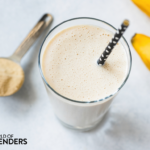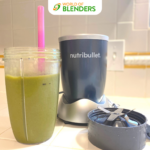This post may contain affiliate links. If you use these links to buy something we may earn a small commission. Thanks.
My wife and I have tested almost every single vegetable that exists to come up with our list of the 21 best vegetables for smoothies!
I’ve been a smoothie fan my whole life, but I’ve been trying to lose weight recently so we started experimenting with different healthy vegetables for smoothies. It’s been great for cutting calories!
I’ll share our big highlights and then do a deep dive on why I believe these are the 21 best veggies for smoothies. We also included 9 of the vegetables we tested that you should AVOID in your smoothies.
- 30 Best Vegetables For Smoothies
- 30 Best Vegetables for Smoothies
- 1. Acorn Squash
- 2. Avocado
- 3. Beet Greens
- 4. Beets
- 5. Bell Peppers
- 6. Bok Choy
- 7. Broccoli
- 8. Butternut Squash
- 9. Carrots
- 10. Cabbage
- 11. Cauliflower
- 12. Celery
- 13. Collard Greens
- 14. Cucumber
- 15. Dandelion Greens
- 16. Edamame
- 17. Ginger
- 18. Herbs
- 19. Kale
- 20. Microgreens
- 21. Moringa
- 22. Pumpkin
- 23. Radish
- 24. Romaine Lettuce
- 25. Spinach
- 26. Sweet Potatoes
- 27. Swiss Chard
- 28. Turmeric
- 29. Yellow Summer Squash
- 30. Zucchini
- Common Questions About Vegetables For Smoothies
- Final Verdict: The Best Vegetables For Smoothies
- 30 Best Vegetables for Smoothies
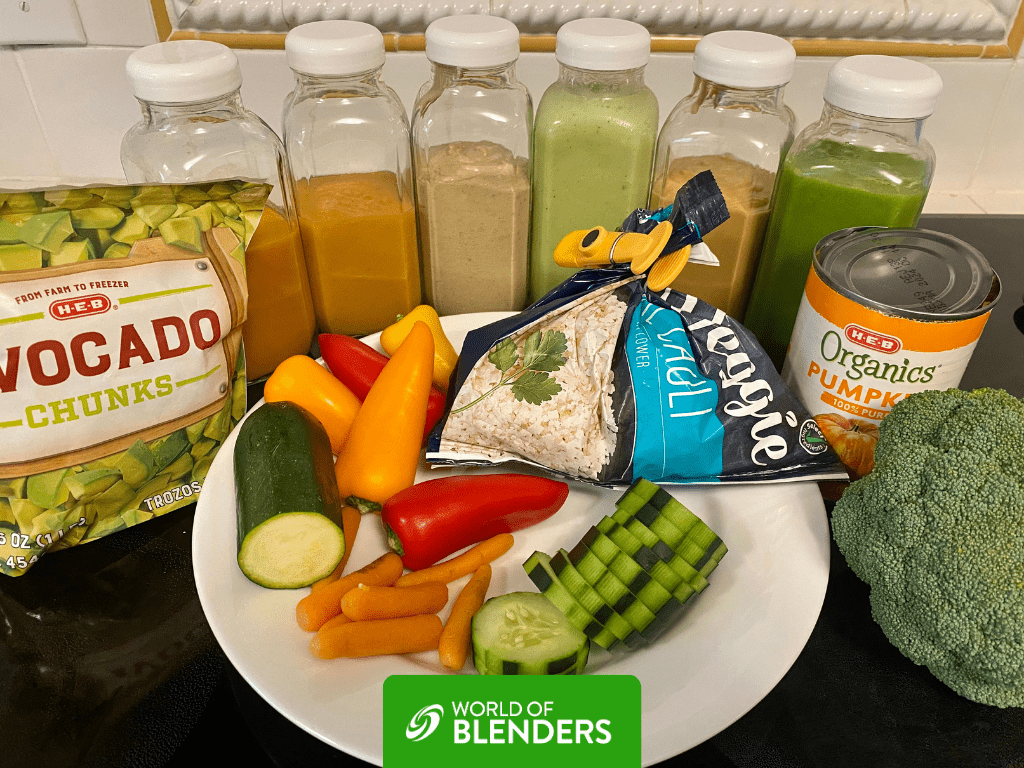
Quick Summary: What Vegetables are Good for Smoothies?
After countless smoothies and testing different vegetables, we’ve come up with our full list (skip below if you want to see all 21).
There are lots of great vegetables for smoothies, but it depends what you’re looking for.
Here’s our summary:
- Highest in Fiber – If you want high fiber smoothies, you need to load up on the green veggies like spinach and kale. You can also incorporate different squashes and cauliflower.
- Best for creamy smoothies – If you want to make smoothies creamier, you’ll want to go for avocado, sweet potatoes, cauliflower, or different squashes. Avoid leafy vegetables.
- Great for digestion – There are a number of vegetables that are proven to help with digestion! Add ginger, turmeric, beets, cabbage, and microgreens.
- Lowest in calories – Most vegetables are super low in calories! Celery, cucumber, and beets are some of the lowest out there.
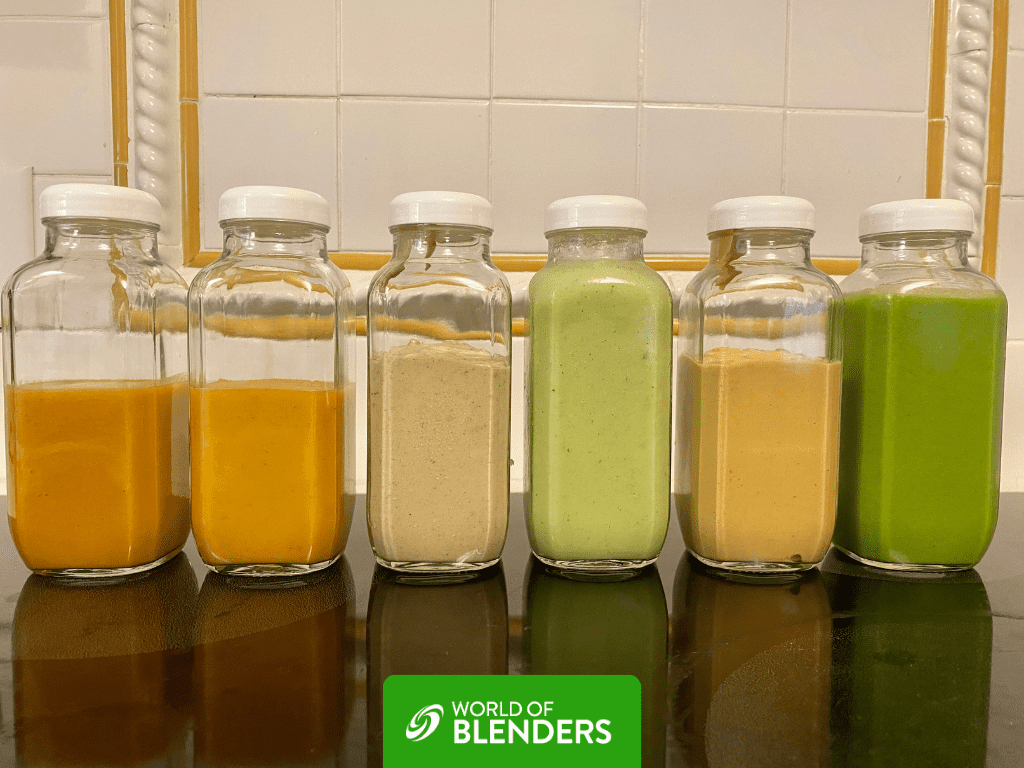
21 Best Vegetables for Smoothies that Actually Taste Good
A few months ago we put together a master list of 30 veggies. We’ve been testing a bunch of different smoothies and we’ve been sharing our own smoothie recipes. Only 21 of the 30 made the cut for our list of the best veggies for smoothies.
1. Spinach
Spinach has long been hailed as a superfood due incredible array of vitamins and minerals contained within each leaf. We’ve included it in almost all of our recipes because it’s one of the best vegetables to blend in smoothies.
It’s easy to make delicious spinach smoothies with just a few ingredients. Try blending spinach with avocado, banana, mango, and milk, for a thick and creamy smoothie.
The extra fiber from spinach makes it one of the best meal replacement smoothies or keto smoothies!
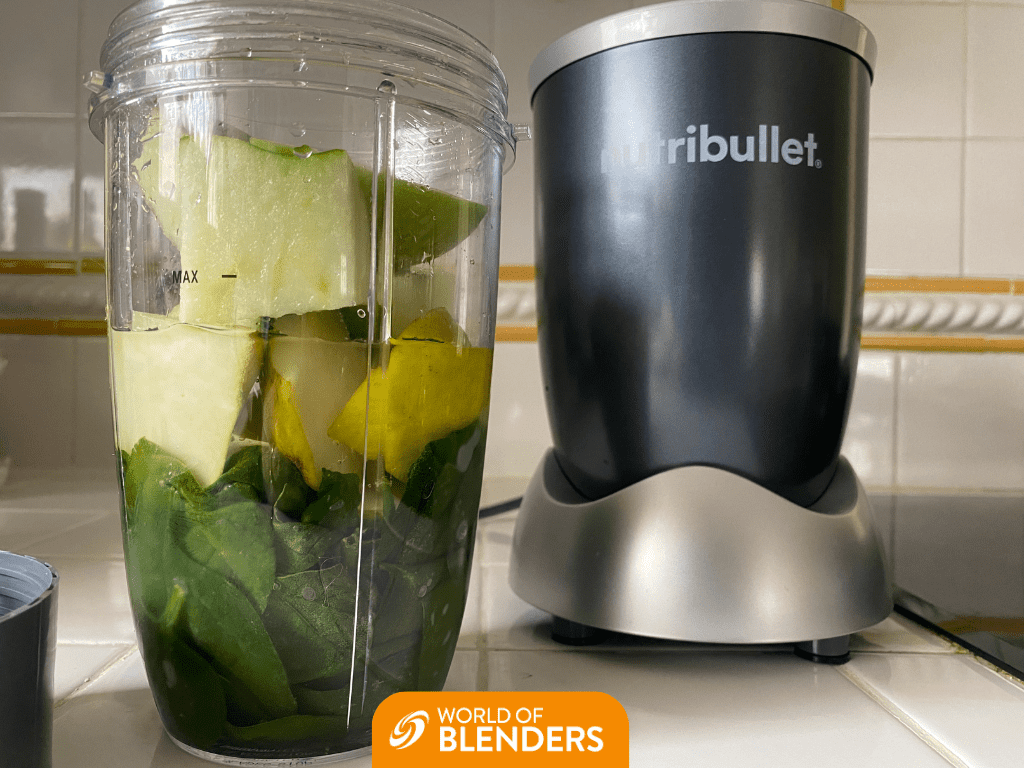
2. Kale
Kale is one of the healthiest vegetables for smoothies – making it an ideal choice for adding to your favorite green smoothies.
Check our our list of smoothies with kale or green smoothie recipes for more ideas!
I recommend trying a smoothie made from kale, avocado, pineapple, banana, cashew nuts, ginger and lime juice. Kale requires a bit more liquid in your smoothie so if you aren’t careful you’ll end up making a smoothie foamy.
Benefits of kale in smoothies:
Kale provides ample amounts of Vitamin A & C and dietary fiber which helps keep us full for longer. This leafy green vegetable also contains powerful phytonutrients like lutein & zeaxanthin, which act as natural antioxidants and support healthy vision.
3. Avocado
Though technically a fruit rather than a vegetable, I’ve included avocados in this list as they are nutritionally more like vegetables and are one of the popular smoothie ingredients.
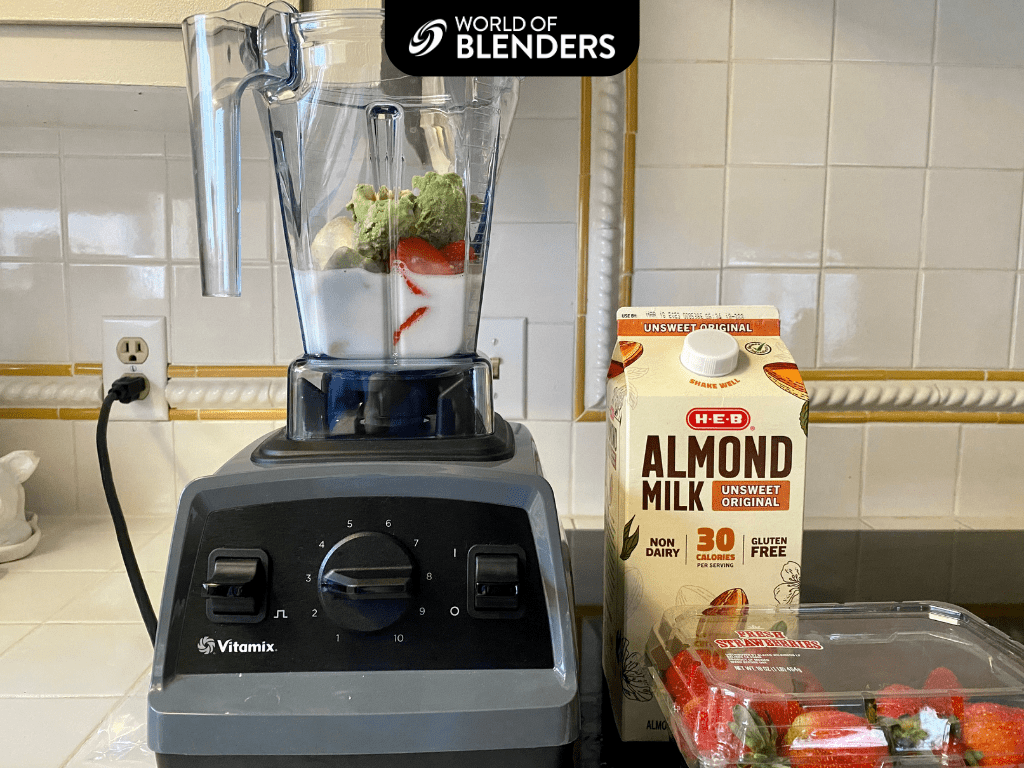
Avocado adds creaminess to any smoothie without adding extra sugar or calories. It also contains healthy fats, fiber, vitamins A, C, E and K, potassium, and magnesium. This is why it’s one of the best yogurt substitutes for smoothies!
Try blending avocado with banana for an extra creamy treat, add some nutritious spinach, or combine avocado with mangoes, pineapple, and coconut milk for something more tropical and exotic.
4. Microgreens
Microgreens are tiny versions of fully grown plants containing concentrated nutrients within their small leaves. This makes them incredibly nutritious when added to juices or shakes.
Their delicate texture brings out bright flavors from other ingredients present within each sip, and they contain vitamins A and C alongside Iron & Magnesium too.
You can make a sweet pea microgreen smoothie using microgreen pea shoots, avocado, kale, mint, coconut water and ice.
5. Cauliflower
Have you ever considered having peanut butter with cauliflower? In a smoothie, it works surprisingly well! Just blend your cauliflower with peanut butter or another nut butter of your choice, plus banana, dates, and almond milk. Cauliflower can be a great way to make smoother smoothies as well!
Benefits of cauliflower:
Cauliflower is high in fiber, which helps keep you full longer and aids digestion. It’s also rich in vitamins A, B6, C, K, and folate, as well as minerals like magnesium and potassium.
And as if that wasn’t enough, cauliflower also acts as an anti-inflammatory due to its high levels of antioxidants, such as beta-carotene and lutein, which help reduce inflammation throughout the body.
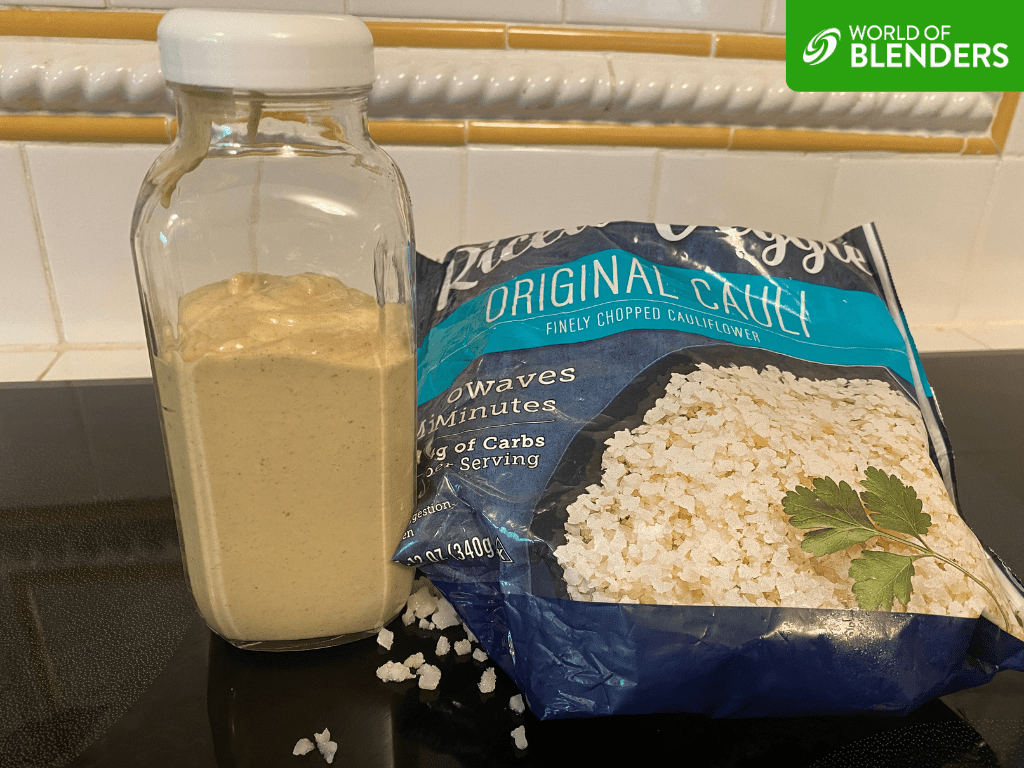
6. Celery
The main benefit of adding celery to your smoothies is its incredibly low calorie count – only around 6 calories per stick!
In addition to being very low in calories, celery provides essential minerals such as calcium and magnesium, which are important for bone health, and electrolytes such as sodium and potassium, which are important for hydration levels in the body. This is why it’s one of the healthiest vegetables for smoothies!
The only downside is that blending up celery can make a smoothie separate.
I like to combine celery with apple, banana, spinach, ginger, and lemon juice.
Read more: Do smoothies make you poop?
7. Sweet Potatoes
Sweet potatoes are a great addition to smoothies because they provide natural sweetness and an array of vitamins and minerals. They also help to thicken up the consistency of your smoothie, adding texture.
You can make a comforting winter smoothie using sweet potatoes, pumpkin spice, cinnamon, honey, and milk. Sweet potatoes are great for making smoothies sweeter and creamier!
Sweet potatoes contain high levels of vitamin A, essential for eye health, as well as vitamin C, manganese, copper, pantothenic acid, and dietary fiber. The natural sweetness also make it a healthy substitute for bananas in smoothies!
Sweet potatoes are super affordable so it’s a popular ingredient on our list of cheap smoothies and our list of whole30 smoothies for weight loss because it helps make it creamier!
8. Cucumber
Cucumber is a great addition to any smoothie. It has a light, refreshing flavor that pairs well with many other fruits and vegetables. Why not try it with pineapple, banana and coconut milk?
Cucumbers are low in calories but high in fiber, which helps keep you feeling full longer and aids digestion. They also contain antioxidants like vitamin C and beta-carotene and are rich in potassium, magnesium, calcium, iron, and zinc. Cucumber is popular in our list of diabetic friendly smoothies!
The water content in cucumber makes it a great ingredient for making smoothies thinner.
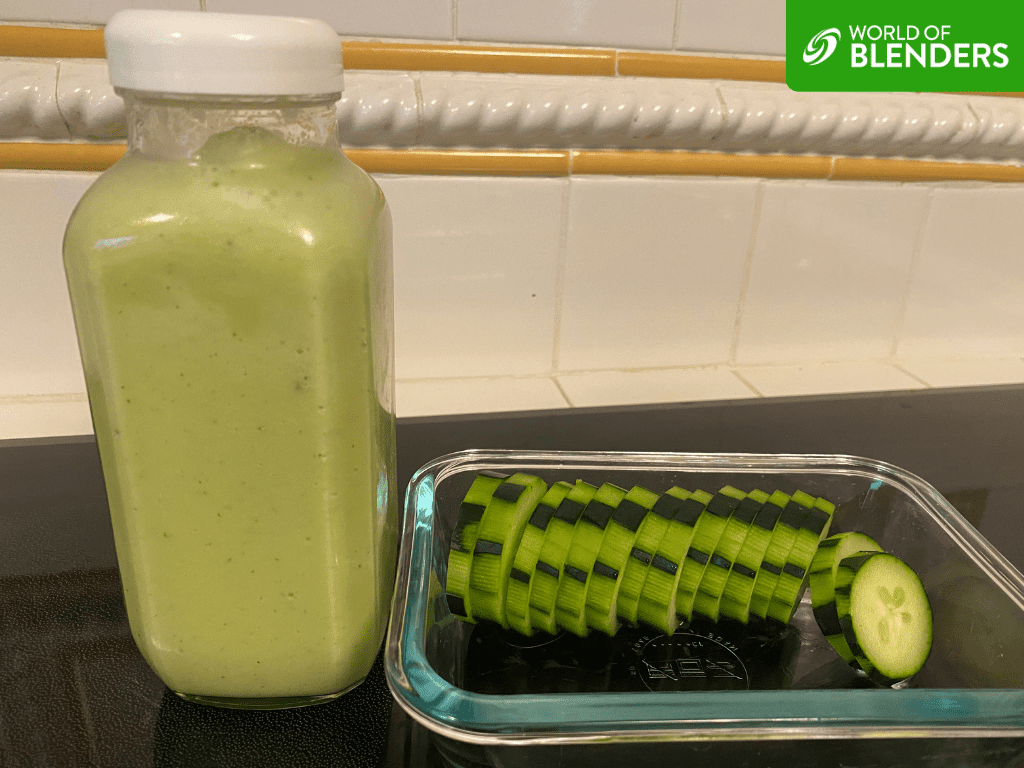
9. Dandelion Greens
The flavor profile of dandelion greens is slightly bitter yet earthy at the same time. However, blended into a smoothie, it takes on more subtle flavors that blend nicely with other ingredients.
For those who don’t enjoy the taste of dandelion greens, adding some honey or maple syrup will help balance out its bitterness. I also recommend combining dandelion greens with banana, pear, spinach, and ginger.
Dandelion greens are a nutritional powerhouse packed with vitamins and minerals. They contain high levels of vitamins A, C, K, and B6, as well as calcium, iron, magnesium, and potassium.
10. Beets
Beets are a great addition to smoothies, providing an earthy flavor and vibrant color. To offset the earthy taste of the beets, try adding pineapple and berries to your smoothie.
Beets are packed with essential vitamins and minerals such as folate, potassium, magnesium, iron, and vitamin C. The nitrates in beets can help improve blood flow throughout the body and reduce inflammation.
11. Butternut Squash
Butternut squash adds sweetness without extra sugar or calories, while still packing plenty of nutritional value into every sip of your smoothie.
For a change from green smoothies, try blending butternut squash with raspberries, mango, cinnamon, nut butter, chia seeds, and milk.
Butternut squash is rich in dietary fiber, which helps keep you feeling fuller longer while promoting healthy digestion. It contains beta-carotene, which aids healthy vision & protects your skin from sun damage.
12. Carrots
Carrots are loaded with beta-carotene (vitamin A), lutein (an antioxidant), and many other essential vitamins & minerals. Their natural sweetness makes carrots perfect for adding sweetness without too much added sugar.
I recommend trying a carrot and fruit smoothie, where the carrot is blended with apple, banana, pineapple, and orange juice.
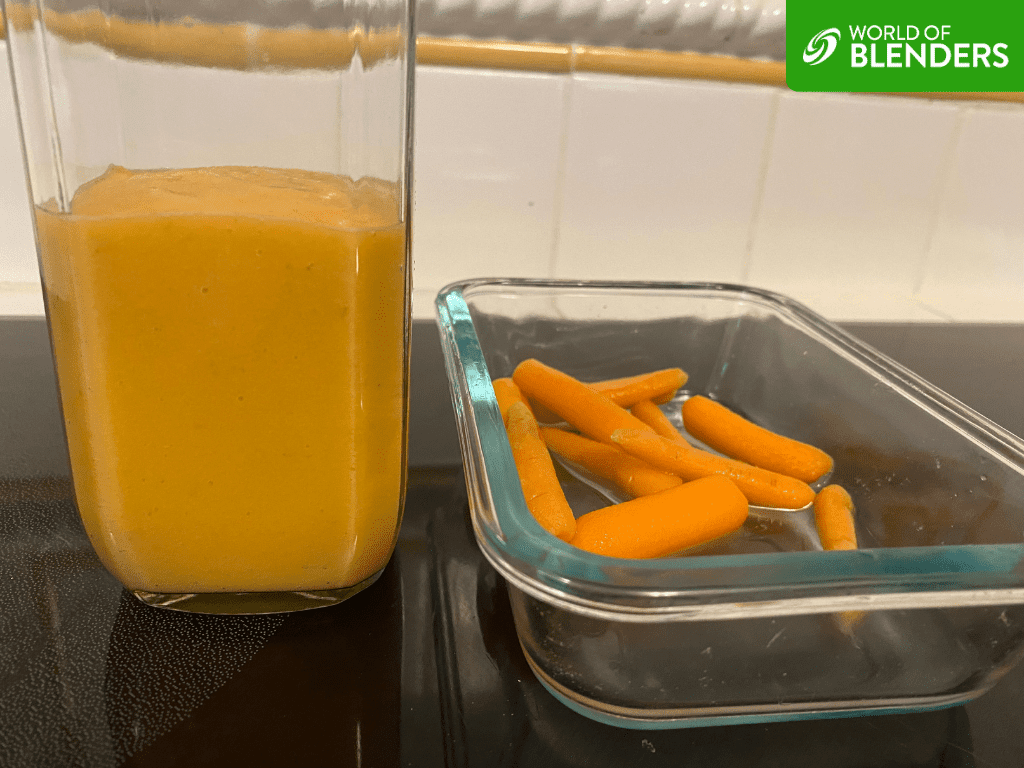
Carrots are a popular ingredient on our list of low sugar smoothies!
13. Edamame
Edamame is an excellent source of plant-based protein that makes it perfect for vegan or vegetarian smoothies.
I highly recommend trying a green smoothie with edamame, spinach, ginger, lime juice, and ice.
Edamame contains essential vitamins and minerals such as folate, magnesium, phosphorus, potassium, zinc, and vitamin K.
14. Ginger
Ginger adds a zesty kick to any smoothie recipe thanks to its spicy flavor profile.
For a really fresh-tasting smoothie, try adding ginger to a blended mix of lemon, chia seeds, peach, pineapple and coconut milk.
Not only does it taste great, but ginger also has many health benefits too! Studies have shown that ginger can help reduce inflammation in the body which may aid digestion and improve overall health.
Ginger is a popular ingredient in our list of colon cleansing smoothie recipes!
15. Herbs
Herbs like basil, parsley and mint are a wonderful way to add freshness and flavor to any dish, including smoothies!
Basil is known for its anti-inflammatory properties, while mint helps soothe digestive issues like nausea or bloating. Parsley contains plenty of antioxidants that can help protect against free radical damage caused by environmental pollutants.
You can combine lots of herbs to make one delicious herbal smoothie. For example, why not try some yogurt, olive oil and lemon juice, blended with parsley, chives and basil?
16. Moringa
Moringa is often referred to as “the miracle tree” because it packs quite a nutritional punch. It provides generous amounts of proteins alongside important vitamins and minerals, such as amino acids, beta-carotene, calcium, copper, iron, and magnesium.
Moringa’s earthy taste pairs particularly well with sweeter ingredients. One tasty moringa smoothie to try combines moringa with strawberries, banana, spinach and milk.
17. Pumpkin
Pumpkins aren’t just Halloween decorations – they are a fantastic smoothie ingredient too!
Pumpkin is a rich source of vitamins A and C, plus potassium and beta-carotene antioxidant compounds, which fight off damaging free radicals.
Try blending pumpkin puree with yogurt, banana, nut butter and spices to make a delicious pumpkin pie smoothie. If you want to make thicker smoothies, pumpkin will be super helpful!
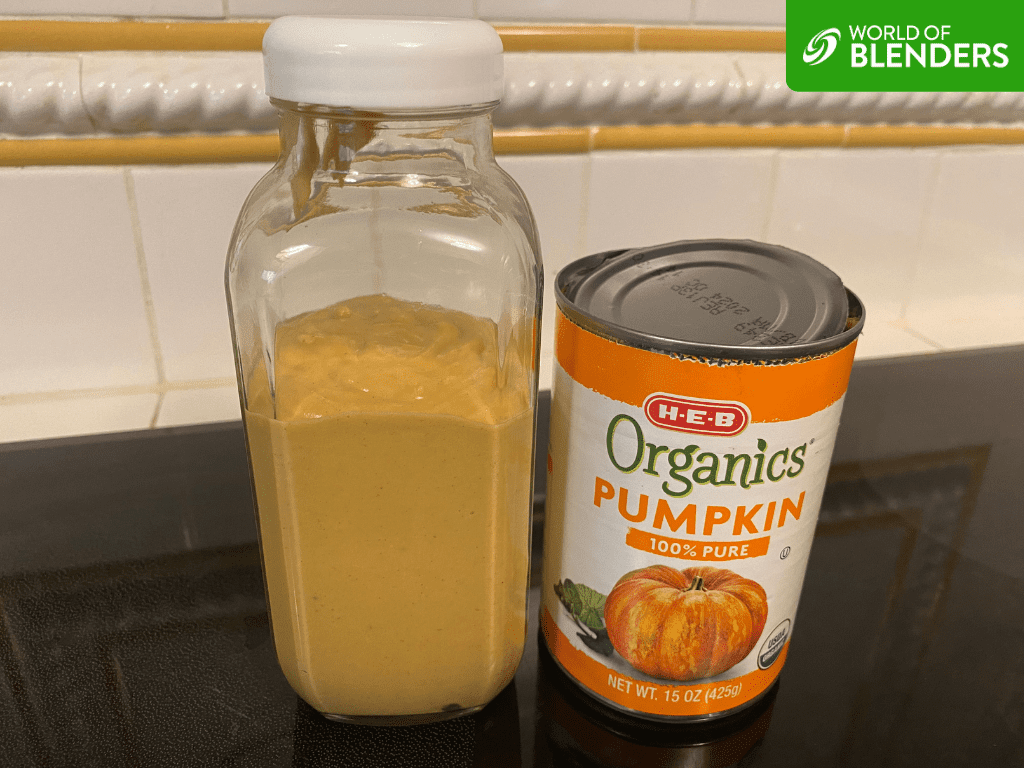
18. Radish
Radishes make great additions to smoothies, with their peppery flavor adding a nice touch of complexity.
A radish smoothie that I often make combines the radishes with beets, carrot, parsley, yogurt, and milk
Radishes contain high amounts of vitamin C and B6, as well as fiber to aid digestion.
19. Turmeric
Turmeric has been used for centuries due its anti-inflammatory properties. It also provides other benefits when added to smoothies, such as improved digestion and better absorption of nutrients from food sources. It’s great for making anti inflammatory smoothies!
This yellow spice contains curcumin which helps reduce inflammation in the body while providing antioxidant protection against free radical damage caused by environmental toxins such as pollution or smoke inhalation.
I like to add turmeric to smoothies that contain fruits like pineapple and mango.
20. Acorn Squash
Acorn squash is a great addition to any smoothie. It has a mild, sweet flavor that pairs well with other fruits and vegetables in the blender. I recommend trying it with banana and kale, peanut butter, seeds, and vanilla extract.
Acorn squash can be used raw or roasted for added sweetness, depending on what type of texture and flavor you prefer. It is packed with nutrients like vitamins A, C, B6, and magnesium and is high in fiber which aids digestion and helps keep you full for longer.
21. Yellow Summer Squash
Yellow summer squash is an excellent source of beta-carotene which converts into Vitamin A once consumed. This nutrient plays an important role in maintaining healthy eyesight, boosting immunity and cell growth, and repairing processes within our bodies.
One delicious yellow squash recipe that I highly recommend combines squash with frozen raspberries, dates and unsweetened almond milk.
Yellow summer squash also contains folate (vitamin B9), which aids red blood cell production, making it beneficial for pregnant women who need extra folate.
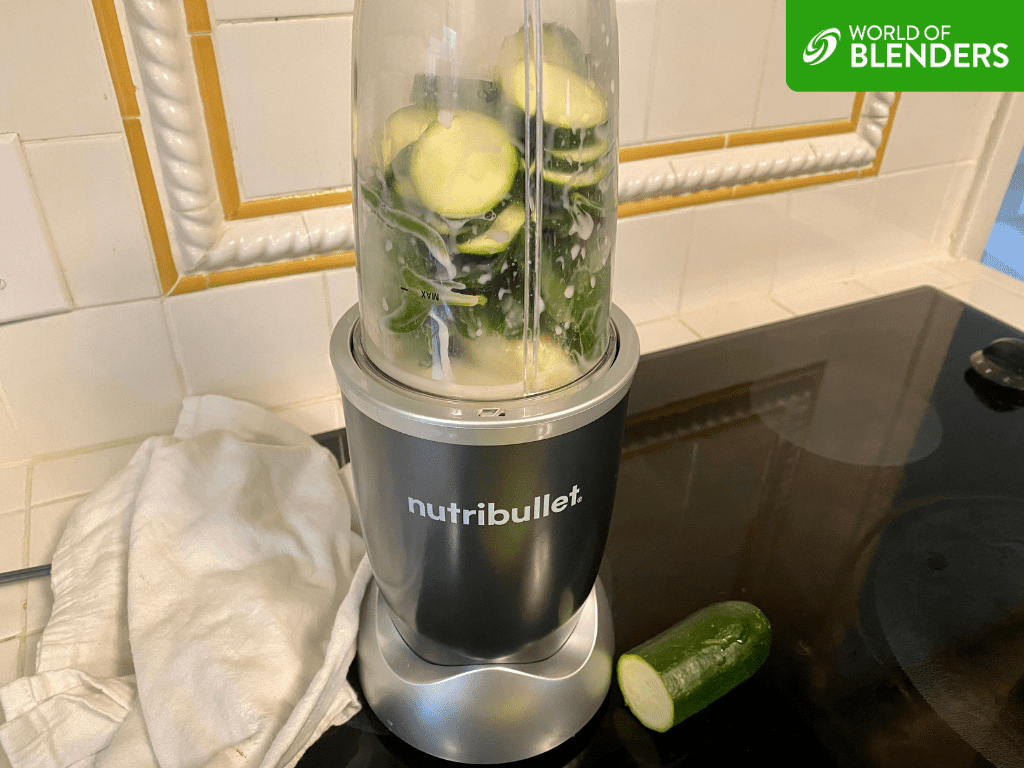
9 Vegetables for Smoothies to Avoid
There are a bunch of people recommending vegetables for smoothies that are healthy and great to eat, but they shouldn’t be used in smoothies. I love broccoli and cabbage, but I’ve never had a smoothie with them that tasted good.
If you want to make great smoothies, use the vegetables above and skip the vegetables below.
To be clear, these aren’t all terrible or bad. We just think there are better options and that this list of vegetables are better enjoyed with other cooking methods.
| Green Veggie | Why we don’t like it for smoothies |
| Romaine lettuce | Romaine isn’t a good fit for smoothies. It blends super easily, but it ends up being super watery. It doesn’t go well with milk and fruit for smoothies. |
| Zucchini | I’m not a fan of zucchini in general, but the problem for smoothies is the texture. It’s a weird mix of being stringy and kind of “gloopy”? Can’t think of a better way to describe it. |
| Green cabbage | Green cabbage is a bit funky for smoothies. It has more flavor than other greens for smoothies, but not in a good way. |
| Green bell peppers | Green bell peppers are fairly bitter! They’re great roasted or sauteed, but they don’t pair well with fruit for smoothies. |
| Beet greens | Beet greens are really bitter so they don’t go well in smoothies! You’re much better eating a few of these on a salad. |
| Broccoli | Broccoli is one of our favorite veggies to roast in the oven, but it doesn’t go well in smoothies. When you blend it, the smoothies are too gritty. |
| Swiss chard | Swiss chard is similar to kale, but it’s more bitter. It doesn’t blend up super well. Spinach and kale are better options. |
| Collard greens | Collard greens aren’t bad, but there are a lot of better leafy greens for smoothies. These are much better cooked low and slow so they soften. |
| Bok choy | Bok choy isn’t a great fit for smoothies because it doesn’t pair well with fruit or milk. Bok choy is incredible if it’s cooked the right way! We love to saute it with a bit of garlic and red chilis. |
Benefits of Putting Vegetables in Smoothies
There are all kinds of benefits of smoothies and putting greens in smoothies is the best way to make them healthier.
- Good for digestion – Leafy greens are usually packed with insoluble fiber which is the key to keeping your digestive track moving. That’s why a bunch of our smoothies for constipation are full of greens.
- Adds volume but no calories – One of the benefits of adding greens to smoothies is that you can make more filling smoothies without adding a bunch of extra calories. A couple handfuls of spinach will help fill you up.
- High fiber – A bunch of these greens for smoothies are packed with fiber. If you want to make high fiber smoothies, add some extra leafy greens into your next smoothie.
- Hit your daily targets – Most Americans are deficient in eating enough fruits and veggies. Eating a green smoothie every day can be a massive headstart to getting enough veggies in your diet.
- Bone Health – There’s solid research that shows bone health is benefitted by Vitamin K. Spinach and kale are both loaded with Vitamin K1!
- Weight loss – Most of these green veggies for smoothies are super low in calories! Our typical green smoothie recipe has anywhere from 200-300 calories making them great for weight loss.
Common Questions About Vegetables for Smoothies
The most popular vegetables that go well in smoothies are spinach, kale, carrots, beets, cucumbers, and celery. Add greens like spinach or kale to your smoothie to boost vitamins and minerals. Carrots provide beta-carotene for eye health, and beets are antioxidants that protect cells from damage. Cucumbers can make your smoothie more refreshing, while celery adds a crunchy texture.
Fresh fruits and vegetables are the healthiest thing to put in a smoothie. Fruit and vegetables provide vitamins, minerals, antioxidants, fiber, nutrients and vitamins. Add healthy fats, such as nut butters or chia seeds, for added protein and omega-3 fatty acids, while adding superfoods like spirulina or wheatgrass powder can give your smoothie an extra boost.
Some popular vegetable pairings include carrots and celery, spinach and kale, cucumber and bell pepper, beets and sweet potato, zucchini and avocado. You can also add in some herbs like parsley or cilantro for extra flavor. Experiment with different ingredients until you find the perfect combination for your smoothie.
Final Verdict: The Best Vegetables For Smoothies
If I had to choose just a few, the best vegetables for smoothies are spinach, kale, sweet potatoes, and celery. I’ll also mention avocado, as – while technically a fruit, not a vegetable – it is an essential ingredient in many smoothie recipes.
- Spinach – Low in calories and carbs, high in fiber, and packing a range of vitamins and minerals, such as vitamin A, C, K, calcium, and potassium.
- Kale – All the benefits of spinach, but with a stronger, peppery taste for those who want more flavor.
- Sweet Potatoes – Less about taste and more about texture. Yes, they are tasty and nutritious, but perhaps the main advantage of adding sweet potatoes to your smoothie is the delicious creamy texture they produce.
- Celery – Fantastic for bulking up a smoothie while adding very few calories (approximately 6 calories per celery stick!).
- Avocado – While technically a fruit, not a vegetable, avocado is an essential ingredient in many smoothie recipes and a great ingredient to use when you want a thicker smoothie.
While I have chosen these few vegetables as the best for smoothies overall, as you can see from my list of 30 vegetables that work well in smoothies, there are many different vegetables to try.
The best vegetable for your smoothie depends on the other ingredients you include and your tastes. So pick a few vegetables from the list above and experiment to discover your personal favorites.
